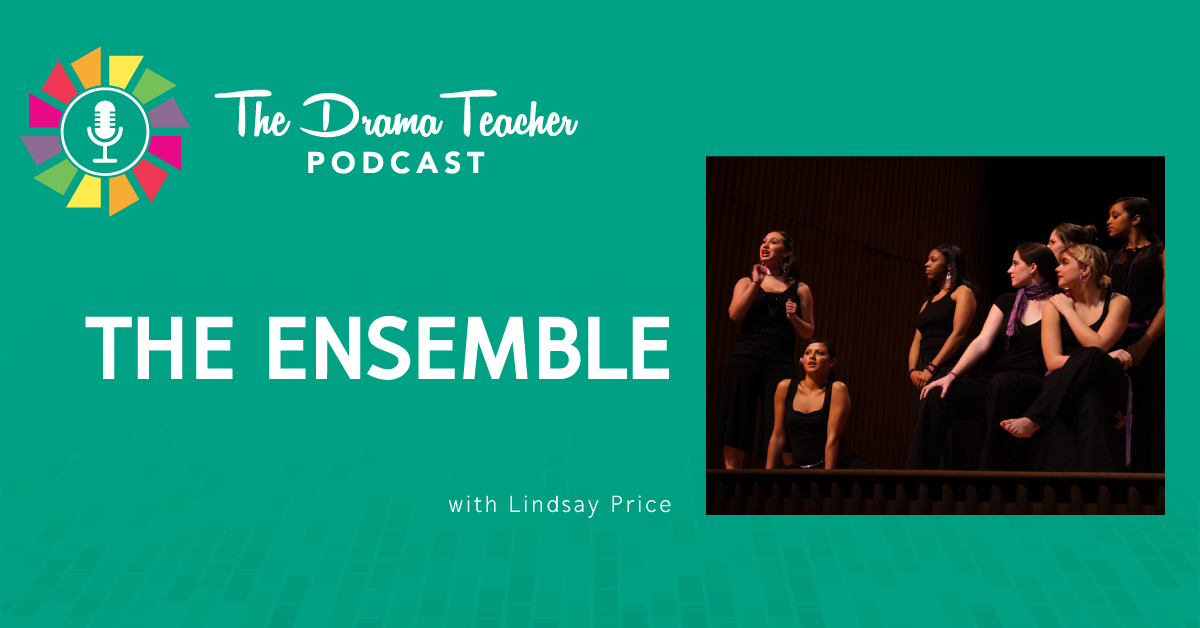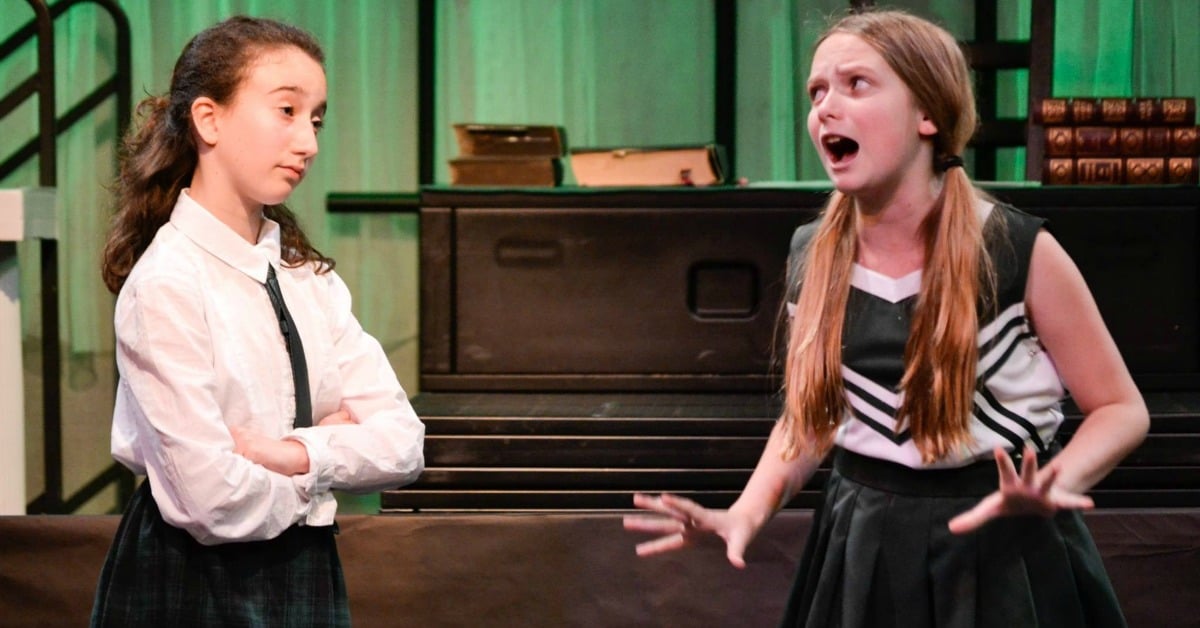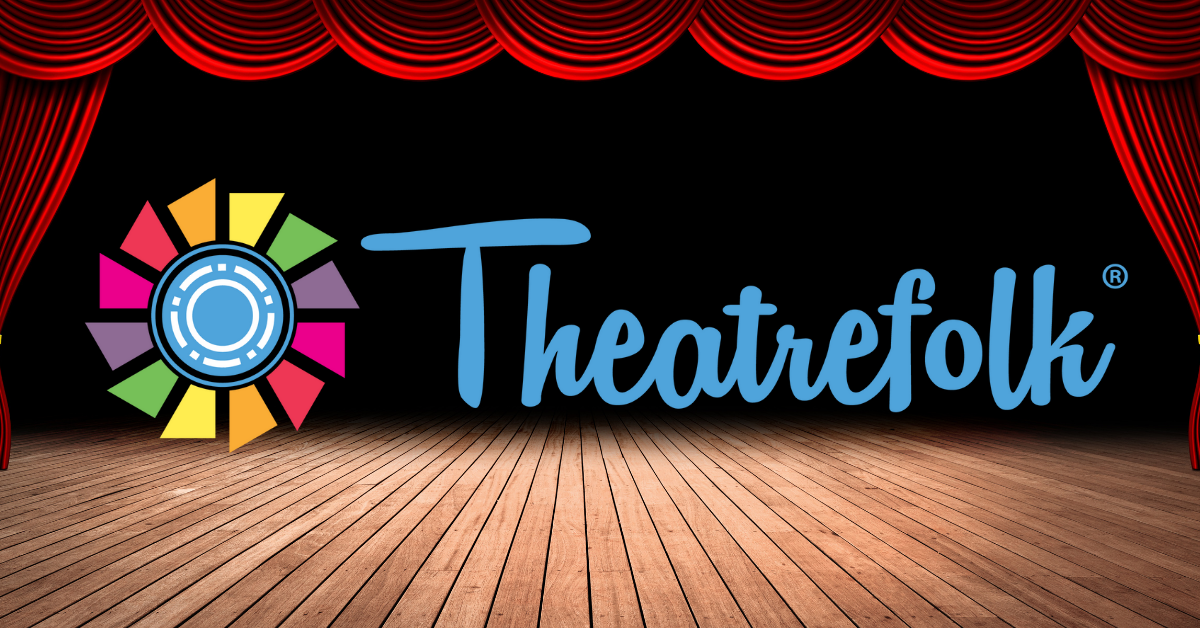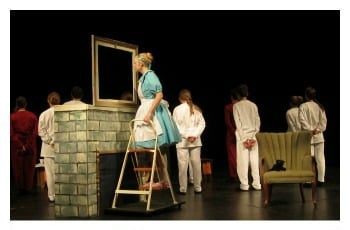The Ensemble in High School and Middle School Plays
Episode 56: The Ensemble in High School and Middle School Plays
Lindsay’s favourite group in a play is often the ensemble. But at the high school and middle school level, being in the ensemble can often feel second class. What can you do to make the ensemble first rate?
Show Notes
Subscribe to The Theatrefolk Podcast
Episode Transcript
Welcome to TFP, the Theatrefolk podcast. I am Lindsay Price, resident playwright for Theatrefolk please do not lower the safety bar, I will do it for you. Hello, I hope you’re well, thanks for listening.
Episode Fifty-Six: The Ensemble
What I’m going to talk about today is taking back reposing the original meaning of the word Ensemble, wrenching it from the dirty word it’s become especially within high school and middle school plays. And what are some exercises that can make a cast divided work together as a whole, as a community, as an ensemble.
So the word ensemble has more than one meaning these days. In the theatre the word has come to represent a division – here are your leads, here are your less than leads. If you’re in the ensemble, sometimes that means, you’re not good enough. And that is such a damaging stigma. It’s one that has a lot of implications in the high school and middle school production. If you’re fifteen years old and you get the ensemble, that can heavy weight for some teens to bear. It can feel like you’re not good enough as a human being, let alone as an actor.
And I get that feeling. And I get that you want to be the star. I get that many find their way into the theatre because there’s a desire to be front and centre. You know, they want to be the one chewing the scenery, in the spotlight, getting the applause. They want the accolades, to be the one who says “you love me, you really love me!” At the school level, I’ve seen actors get a script and start counting their lines. I’ve seen them get into a one-up man ship, I’m better than you because I have more lines than you. I’ve seen young actors puff up at being “the lead” and deflate at “only being in the ensemble.” There’s a stigma. There’s a difference. A division.
But the origin of the word ensemble comes from the exact opposite place. If you look in the dictionary, if you’re one of those folks. I am one of those folks, I have dictionary.com on speed dial. In a bizarre way. But the origin of ensemble comes from Latin and then through French (for all you spelling bee junkies out there) to mean at the same time, no division but something together. And because now it’s in my head because I said it, so side tangent, I used to love, I love words and I used to love watching the National Spelling Bee. But I really miss the old days when they just used to put the spelling bee up in the afternoon on a Sunday on PBS or something, very small and low key, just the kids and the words. Instead of the way they have it now trying to present these story packages and making this event all flashy. It’s not flashy, it’s a spelling bee. It is theatre though, there is so much character and subtext, to see these kids some of whom who have never seen the light of day struggle with a word and then there’s that bell and you can see the crushing defeat of generations in their eyes or when they get the word and the smell of victory. It’s an amazing thing to watch as an observer of human kind… It was so wonderful when it was just the kids and the words. And I don’t like 25th Annual Putnam County Spelling Bee. There I said it. I don’t like the songs, I don’t like the characters. I think the songs are unmemorable. I said that too. Huh.
Back on tangent! The word ensemble originates with the concept of all at the same time. And adding on to that it has evolved into meaning that takes individual parts and puts them toward one whole. For example:
- A unit or group of complementary parts that contribute to a single effect,
- all the parts of something considered together and in relation to the whole
- the general or total effect of something made up of individual parts
- all together, all at once.
This notion of all the parts working together toward one whole is what I envision when I think of the word ensemble. That’s what I always loved about being a part of a play, being with a group where we were all in the same boat, going in the same direction. And I would say that the type of play that signifies who I am as a playwright is the ensemble play. Not plays that have a couple of shiny parts and too bad for the rest of you, but plays that depend on every actor working together for the good of the play. For the good of the one.
And this attitude I guess is how we deal with the stigma of the ensemble being second class. This is how we encourage high school and middle school casts to respond to the word ensemble in a positive manner.
From day one think of the entire group as the ensemble. Call them as such. Emphasize that everyone is working toward one whole. Every actor, everyone involved. That an ensemble is all parts together, and only works when every part is cohesive together not one side here and one side there. An ensemble is a community and that is what the cast of a play should be. It’s not about me or I. It’s about us and we. We belong to a community, the production, the company of players. And to get this it lies in the director or the teacher, they gotta set the tone. To make this happen.
And what does that mean, that means teaching the community to work together from the first rehearsal. Incorporate exercises at every rehearsal that involve the entire cast working together and that only work if the entire group comes together as one.
For example: Perfect circle. Have the actors form a perfect circle. Give them time to work out all the kinks. Then have them break apart and re-form that perfect circle without speaking, no verbal communication. They have to find a way to work together, to communicate without the obvious, speaking and re-create that circle.
Manhole cover is another great exercise. The group stands in a circle, bends down and picks up an imaginary manhole cover together and raises it above their heads. But, this is mime, so everyone has to communicate and keep consistent the shape of the manhole cover, the size of the manhole cover, the weight. Everyone has to work together to make that happen. Again once they accomplish it, have them repeat the exercise without talking.
Here’s another one. The Group Circle Jump. As a group everyone has to jump up at the same time, and then land while making as little noise as possible on the landing. Once they get that under their belts repeat the exercise without that verbal communication. These are the kinds of exercises I mean that depend on the group as a whole, that only work when the entire group is a cohesive whole.
What else? The Group mirror game. So everyone has done the mirror game in pairs. Right? How about in groups of four, or eight, or twelve? Or what if there are four mirror leads across the front, how do they work together and then how do those following work together to create this one massive, who’s the leader, who’s the follower, everyone is a community being the mirror together.
Practice unison speaking. Pick a poem, or a tongue twister. You know why not make it a vocal exercise as well. Unison speaking is very much a listening activity, and that’s really important too when you’re building a community too right. So it’s not just about me the actor only focused on what I have to say and who cares about the rest of you. If you can build a community of listeners, of listening to what someone else is saying or doing, so that if they get into trouble, they can help each other out because they’ve been listening they know what’s going on, they work together, they help each other out. So with unison you have to listen to what’s going on around you. Listen to the pace of the group around you, instead of just forging ahead on your own.
So these are exercises, of course seem like games. They are games. But they are also skill builders. They push your cast to see each other as team mates, and that the whole of the game can only succeed if they work together. Which hopefully translates to the whole of the production can only succeed if they work together. That is key to the success of the ensemble community.
Now, having said all that is great, it’s lovely, it’s fluffy bunnies, it’s unicorns. You know, whoo hoo we’re a community. Yay. But what do you do if you have a play that is set up to exploit that division of here are the leads and here is the ensemble? It happens, right? How do you encourage the ensemble players that they are indeed part of the production community and that they are as important as the leads? It’s easy for ensemble players to fall under the spell of the stigma and just drop out, or stop trying.
I firmly believe that the ensemble is just as important as the leads because they help create the world of the play.
When I was an actor, briefly, very briefly, I was almost always in the quote un quote ensemble. And funnily enough, I enjoyed it. I was pretty good at it. I was good at being a part of the atmosphere. Not like wallpaper. A static lamp or tree. I enjoyed being a character in the scene, keeping focused on the action even if I wasn’t active in the dialogue. Always staying in the world of the play. My favourite part of all time to this day had four words. Yes, yes, Hello, Sorry. Two hours, four words. And yet I got a lot of feedback from that part because people saw me. I was a living character in the world of the play. Not wall paper, not stealing focus but moping in the corner because I didn’t have more lines or more to do.
And when I’m in the audience, I will find my attention drifting away from the main action to see what those ensemble folks are doing or not doing. I’m sometimes amazed at how little actors engage when they’re in the background. Just because you’re not talking in a scene, does not mean you’re invisible. If you can see the audience, they can see you. And I am watching you. If you’re not in the moment, if you’re picking your nose or scratching your butt, the audience can see that. If you’re not in the world of the play, you’re creating a distraction for the audience, and that means they’re not in the world of the play. And that is a problem.
So I can say till the cows come home, being in the ensemble is great! But if the actors are entrenched in their belief of the ensemble a second class, this issue needs to be addressed. So how would you do that? I would have rehearsals just for the ensemble. Don’t ignore them, it’s easy to do because you may be working on a demanding play that requires a focus on the main action. But if you’re want, if you want to create a community feeling, The ensemble have to feel like they are part of the experience. For example, Making sure each ensemble character has a name and a back ground that helps the world of the play. Make them think about how do they interact with each other, in character of course, while the main action is going on. This is not about giving them stuff to do that is going to steal focus or upstage the play, but it’s all about atmosphere. Encourage the ensemble to realize they are not wall paper but they inform the world of the play. They keep the audience in the world of the play and that is so important.
And frankly you never know what is going to spark the interest of an audience. Time and time again I’ve been at a show and some ensemble player has just shone, not because they’re hogging the attention but because they are so in character, they are so part of the atmosphere – they are a delight to watch. You can capture the audience’s attention with a walk, with a look, with the shrug of a shoulder. With four words, yes yes hello sorry. And what it comes down to is a part is what one makes of it. It can be a bitter boring ensemble experience. I only got four words, I’m not doing anything. Or it can be an exhilarating time within a wonderful life changing community that you will remember forever.
Isn’t that nice. I like that.
So before we go let’s do some THEATREFOLK NEWS. It’s a play feature! It’s a play feature, It’s a play feature, it’s time to feature a play! With a fantastic ensemble! That has a lot to do and won’t have time to think about how they’re not really the focus. But everyone will love them anyway. Riffing. Not good for me. I would say that one of my most popular plays in the Theatrefolk canon is Agatha Rex. This is a modern adaptation of the Greek play Antigone by Euripedes. Both Agatha and Antigone have to stand up for what they believe regardless of the consequences. In the modern version Agatha is not left with a life or death choice – die or apologize but her actions will change her life. She could lose everything she’s worked for simply by standing up for a brother who may or may not be worth standing up for. Since we’re talking about ensemble today, Agatha Rex is a great example of an ensemble that has a lot to do and can’t stand around being wall paper. The Greek Chorus in the original is transformed into an ensemble of high school students. Frankly, it’s the toughest part in the play – they set the scene, they set up the world of the play and it’s characters like Creon who is now transformed from King to principal.
Dr Creon leads our school
He has the right of way
It feels just like an army camp
Death before disobey.
He’s very strict and by the book
He won’t sway left or right.
You break the rules, you play the fool,
You’re out without a fight.
It’s not that we would wish him harm
Or cause him any pain
But we would feel much better if
He was declared insane.
The ensemble acts as foils for Agatha (both encouraging her to act and then backing away when she asks for their help) they are the atmosphere. They act as the voice of the student body. And they have to do it in unison.
What dirty deed’s been done?
Who’s lost before they’ve won?
Who fell from the tower in their final hour
Before the light of sun?
That’s Agatha Rex. You can read sample pages over at theatrefolk.com and see a ton of pictures from sample productions. Go. Read. Buy. Do it.
Lastly, where oh where can you find this podcast? We post new episodes every Wednesday at theatrefolk.com and on our facebook page and twitter. You can find us on youtube.com/theatrefolk. You can find us on the stitcher app, AND you can subscribe to TFP on itunes. All you have to do is search on the word Theatrefolk.
And that’s where we’re going to end. Now I will raise the safety bar and a ghost will follow you home. Kindly watch your step please, watch your step. Take care my friends. Take care.
Music credit: “Ave” by Alex (feat. Morusque) is licensed under a Creative Commons license.



